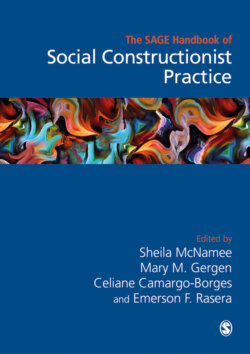Читать книгу The Sage Handbook of Social Constructionist Practice - Группа авторов - Страница 43
На сайте Литреса книга снята с продажи.
The Research Tradition and Constructionist Assumptions
ОглавлениеThe dominant research tradition has emerged within a modernist worldview (McNamee, 2010). Modernism assumes that, with the proper methods, tools and techniques, we will be able to discover reality, as well as describe it, as it really is. Of course, part and parcel of this assumption is the belief that there is a reality to be discovered.
Constructionist thinking, on the other hand, challenges the notion that there is one reality to be discovered. In fact, research within a constructionist frame challenges the very idea of discovery, itself (McNamee and Hosking, 2012; Gergen, 2014). Rather than discover reality, the assumption is that we create reality in our interaction with our topic of research, with the framing of our research objectives and questions and, consequently, with the questions we ask our participants and the observations we make in the environment researched. All research is a by-product of a researcher's interactions within not only the site of research but also his/her interactions within his/her community of scholars and practitioners.
Let us embrace the understanding that there is no reality waiting to be discovered and there is no possibility of a neutral and objective researcher who – with the right tools and methods – will discover how things really are. Let us also invite the radical position that research is an opportunity for innovation and that innovation is embraced by adopting the ideas of multiple truths, multiple realities, and multiple methods for exploring those constructed realities. If we embrace these proposals, we become curious about what sorts of worlds can be made possible through particular forms of research. Our focus is on relational processes that construct our worlds and this is understood as something very different from a focus on discovering how the world (really) is and (really) functions.
The focus on relational processes is the hallmark of a constructionist orientation (Gergen, 2009). This focus represents a shift from examining entities (whether they be individuals, groups, organizations, or physical matter) to attending to what we refer to as language or language processes. Language, to the constructionist, is much more than words or text; it entails all embodied activity. In addition, language is viewed as not simply representing reality. Rather, language is seen as constructing reality. What we do together actually makes our social worlds. Meaning emerges in the interplay of people engaging with each other. And, different communities, groups, and cultures can rightfully negotiate very different meanings and thus live in very different realities. This acknowledgment of diverse meanings, collaboratively negotiated within different communities, is an acknowledgment of the complexity of the world we inhabit. Through innovative research, we can better understand how such realities are created. We can also collaborate with communities who are dissatisfied with their constructed social order to create new possibilities. This understanding invites a deconstruction of our accepted, dominant view of research. In other words, it suggests that we ask: How else might we imagine research? How do we conceptualize what research is when we start from the position of seeing research – like any other interaction – as a collaboratively constructed process?
The questions we ask focus our attention on the implications – or unintended consequences – of our communally constructed worlds. And, it is this attention to what our meanings make possible (or impossible) that is critical for constructionist researchers. The attention is not on proving anything to be right or wrong, but on exploring the implications of stepping into and embracing any particular truth. A researcher's curiosity about the very different worlds/realities/truths of different communities makes it possible to see the ‘local coherence’ for each group. Thus, as we can see, the philosophical stance of social construction helps us shift our thinking from a view of research as a process of discovery to a view of research as a process of innovation. It offers an appealing new story about what counts as research and how to engage multiple voices, methods, and priorities in ways that are creative and innovative.
